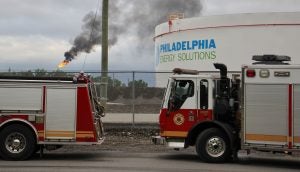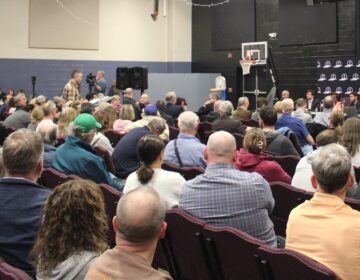The East Coast’s largest refinery is closing; many say a greener future is possible for the site
WHYY’s PlanPhilly spoke with seven Philadelphians, including politicos, neighbors and activists, about their vision for the site’s future. Here’s what they told us.

A large flare burns off fuel at Philadelphia Energy Solutions refinery while firefighters battle a fire there. The wind carried the black smoke toward residential areas of South Philadelphia. (Emma lee/WHYY)
This article originally appeared on PlanPhilly.
—
Philadelphia is buzzing with news that Philadelphia Energy Solutions plans to close its sprawling refinery.
After years of close calls and passionate calls from activists eager to see the gas-making facility gone, a series of financial crises punctuated by a small fire, and then a massive one, led refinery officials to announce Wednesday a plan to shutter.
The largest refinery in the Northeast, the 150-year-old complex covers 1,300 acres on both banks of the Schuylkill River. The closure would mean the loss of more than 1,000 jobs and thousands of other indirect positions.
But this isn’t the first time Philly has been here.
In 2011, the previous operator, Sunoco, announced a plan to shutter the refinery. Over the course of the next year, local leaders including then-Congressman Bob Brady worked to save the facility. They brought in the Carlyle Group, a private equity fund that purchased a two-thirds interest in the refinery, keeping its doors open.
That wasn’t the end of the South Philadelphia complex’s woes. Since then, the refinery faced bankruptcies, fires, and mounting environmental concerns. The refinery is by far the single largest polluter in the city. After over a century and a half of refining, swathes of the site are profoundly contaminated by lead, gasoline, and benzene, a carcinogen.
Now, with the refinery again planning to close, WHYY’s PlanPhilly spoke with seven Philadelphians, including politicos, neighbors and activists, about their vision for the polluted, yet weirdly prime, riverfront land. Here’s what they told us.
Former U.S. Rep. Bob Brady, chairman of the Democratic City Committee
I’ve been speaking with Phil Rinaldi [previous chief executive officer of Philadelphia Energy Solutions], who was the guy I was always dealing with when they were ready to close the refinery down the last time. Back then, he came through with Carlisle and he had the expertise and he put the pieces together and I have faith in him to do it again. We’re trying to get it done again.
According to Phil, it can work and it can make money and it can and should be salvaged. It’s almost too big to fail. The site is so big and there’s nothing really you can do with it because of the contamination. There’s nothing you can really do but have a refinery there.
We are going to try. I’m not going to sit by idle …We have to put our heads together and try to figure this thing out.
City Councilperson Kenyatta Johnson
It’s disappointing as it relates to the thousands of jobs that will be lost. But it also gives us an opportunity to look at safety in our energy and our environment. So we look forward to what the future will be. If it does go in the direction of some type of energy use, we want to make sure it goes along the lines of some kind of sustainable energy that doesn’t have a negative impact on the surrounding areas and residents from an environmental standpoint.
Carol White, a resident of nearby Wilson Park
We want to deal with the community first. We want to have some kind of big celebration and figure out as a community what direction we would like it to go in.
After they clean up their mess, I would love for them to put all solar panels over there so we can have better clean air and conditions for our community…We don’t want to find out that Penn or one of the colleges bought the land before we get a chance to vote on how the land should be set up.
Justin DiBerardinis, director of programs at Bartram’s Garden
Anything you talk about on that land is going to be in the context of vast, staggering remediation.
Everything is pie in the sky because you are connecting it to that very real reality. But the first thing that comes to my mind is the recreation and establishment of that marshland and green space we’ve lost at the confluence of these two rivers.
The public access that would be possible to truly complete the Schuylkill River Trail all the way to its mouth. To see this as the beginning of the reclamation of this stretch of the river is a really powerful … effort.
Christina Simeone, analyst at University of Pennsylvania’s Kleinman Center for Energy Policy
There are certainly areas of that refinery area where you aren’t going to be able to build things because you can’t dig down in the dirt because it’s so contaminated. There will be areas you just have to cover. Maybe solar panels could be put there? Perhaps. I think renewable energy should be part of the conversation, especially on the contaminated brownfield land. But it shouldn’t be the only part of the conversation.
Portions of that 1,300 acres can be remediated to a level where it could accommodate some kind of industrial or commercial reuse. Other portions of the site you probably can’t decontaminate. And that land may have very limited reuses. Typically when land is really contaminated like that you cap it and out concrete over it. You can have a parking lot. Or an airplane runway. Could you put solar panels on that land? Maybe.
Mayor Jim Kenney
This obviously was a tragedy we didn’t expect to happen. I guess they don’t have the financial wherewithal to rebuild. We have to figure out what the next steps are. I don’t know what they are … I have no idea at this moment what will be on those … acres.
Jo Cordon-Hill, organizer with Philly Thrive
We ultimately want the site to be remediated because we know it’s incredibly polluted from 100 years as an oil refinery. We want PES and Sunoco to be held responsible for that remediation because we don’t think it should be left in the hands of the city.
There isn’t total alignment in the communities nearby [about the future of the site], but one thing that could be a reuse of the site is as [a] renewable energy [facility].
We aren’t OK with all these workers just being let go. We want their jobs to be kept and the political decision makers and refinery owners to get them green jobs and healthy jobs … Because this is such a huge refinery, moving it towards renewable energy and having the city and the owners take on that commitment would be a really big step towards a Green New Deal.
WHYY is your source for fact-based, in-depth journalism and information. As a nonprofit organization, we rely on financial support from readers like you. Please give today.








